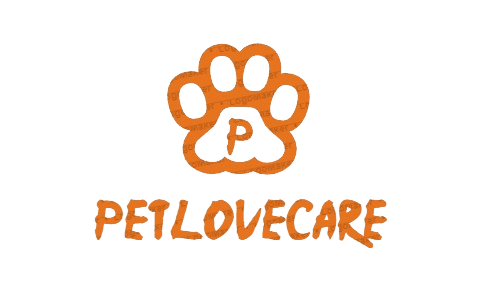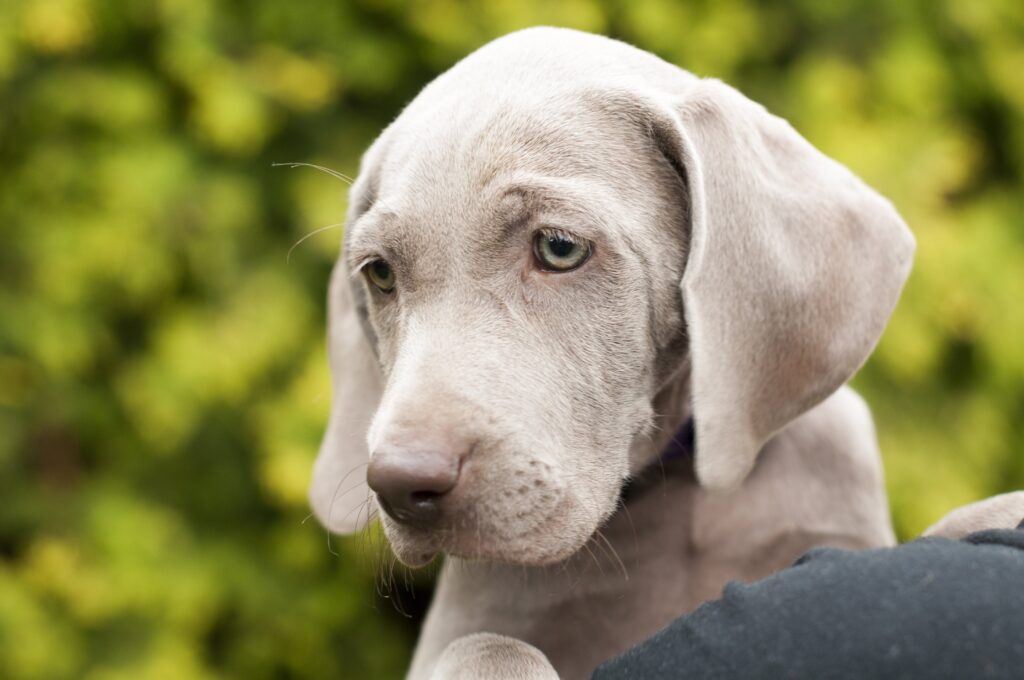Your cute puppy is in a critical developmental stage at 7 weeks old puppy care . Now let’s discuss what you should know about taking care of your tiny pet:
1. Weaning Process:-
At this age, the weaning process has probably begun for your 7 week puppy care. During nursing, the mother dog may get anxious due to the feeling of her pups’ sharp teeth and nails. She will start to wean the puppies and encourage them to try new foods.
To wean the puppy from milk to solid foods, breeders frequently introduce gruel and mush.
Puppy removed before 7 weeks care of age may exhibit increased anxiety and fear, as well as poor socialization and bite inhibition. Certain breeds, such as Maltese puppies, might gain from remaining with their mother and littermates for an extended period.
2. Physical Development:-
Puppy care are in a high growth stage at 7 weeks of age. Everything you feed them aids in their development.
Because of their small bladder, they will require frequent toilet breaks. They might need to urinate every 20 to 60 minutes when they are active.
Puppy choose their potty spots on their own, instinctively, far from where they eat, sleep, and play.
They can hold it for three to four hours at night, but you may need to take them out at least twice.
3. Socialization and New Experiences:-
Puppy should ideally be introduced to their new homes by the time they are 7 weeks old care. Their socialization abilities ought to have grown to a satisfactory level.
o They’re open to trying new things in their surroundings.
o Take puppy classes to teach them the fundamentals of training and to give them confidence.
Keep in mind that every puppy is different, so during this crucial phase, pay close attention to your little one and show them lots of love and care!
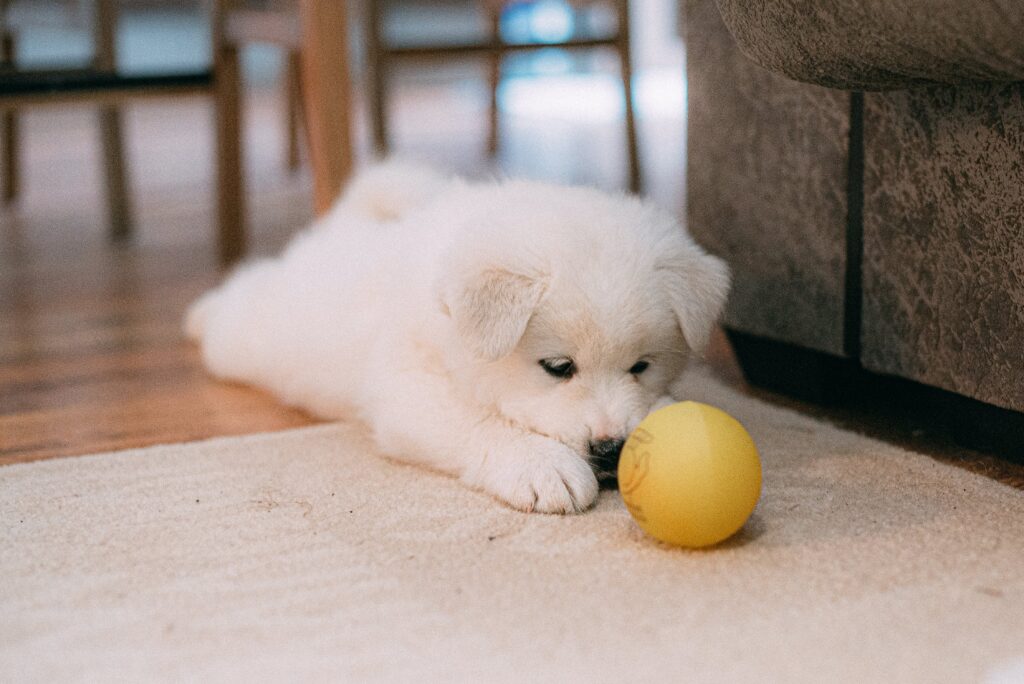

What should I Feed For my 7 week Old Puppy care ?
A puppy that is 7 weeks old care should be fed a diet that encourages growth and development. What you should know is as follows:
1. Transition to Solid Food:-
Puppy care should make a gradual switch from milk to solid food at this age.
Puppy need to eat high-quality food that is made to satisfy their nutritional needs.
2. Needs for Nutrients:-
Protein:- To promote muscle growth, look for a puppy formula that contains high-quality protein.
Carbohydrates:- They help build brain tissue and give you energy.
Healthy Fats:- These are essential for a healthy coat and the absorption of fat-soluble vitamins.
Small, Regular Meals:- To help with digestion and avoid hypoglycemia, feed puppies several small meals throughout the day.
3. Selecting the Correct Food:-
Take into account aspects such as the breed, stature, and dietary requirements of your puppy.
Check the labels of pet foods to make sure they fulfil AAFCO requirements for a balanced diet.
See your veterinarian for advice on recommended brands.
4. Meal Schedule:-
Divide meals into manageable chunks that you take throughout the day.
Serve homemade meals or commercial puppy food that is age-appropriate.
Recall that a healthy diet during this phase lays the groundwork for your puppy long-term health care and wellbeing!
How much should I feed my 7-week-old puppy care?
For your 7-week-old puppy care to grow and be healthy, you must feed them the right foods.
The following guidelines will assist you in determining the appropriate serving size:-
1. Type of Puppy Food:-
Select a premium food designed especially for puppies. The balance of these formulas promotes healthy growth.
Seek for foods high in protein to promote muscle growth and high in fats and carbohydrates for energy.
2. Feeding Frequency:-
Puppies should be fed several tiny meals during the day at this age.
For better digestion and to avoid hypoglycemia, try to eat four meals a day.
3. Portion Size:-
The amount of food is determined by the anticipated maturity weight of your puppy.
Feed approximately 20g of food per kg of body weight as a general guideline.
Modify according to the particular requirements and activity level of your puppy.
4. Size of Breed:-
For small breed puppies, about ½ cup of dry food should be fed daily.
Puppies of Medium Breeds: Approximately ½ cup of dry food daily.
Puppies of large breeds: 1 to 1½ cups of dry food daily.
Keep an eye on your puppy’s weight, modify the serving sizes as necessary, and seek individual advice from your veterinarian.
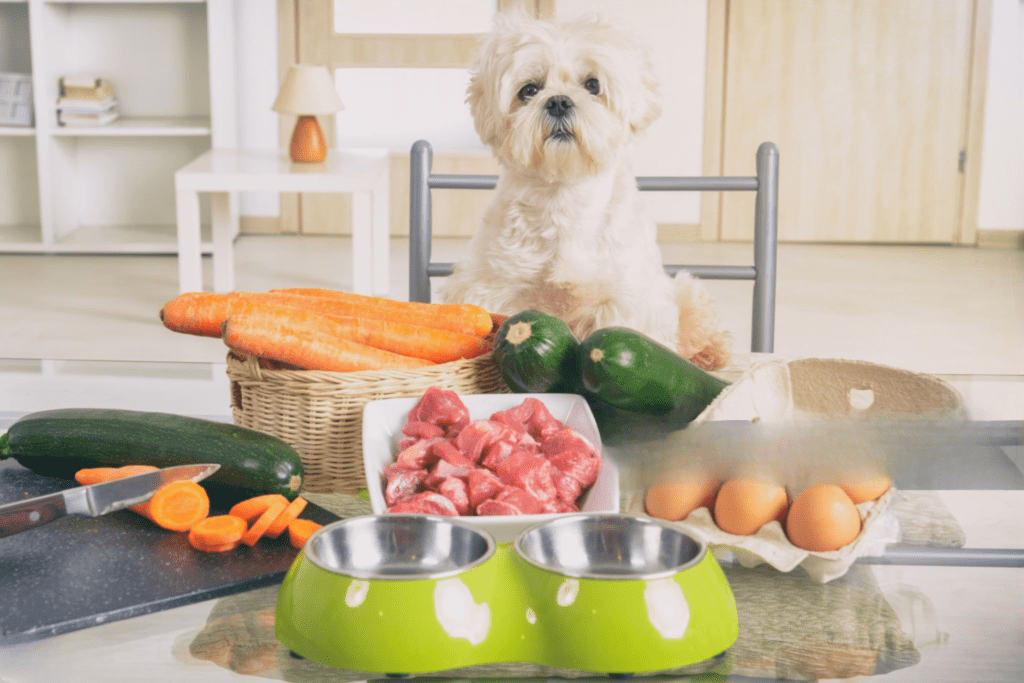

Homemade Recipes For Puppy Food?
You can give these two veterinarian-approved homemade puppy food recipes a try for your furry friend:-
1. Chicken and Spinach Homemade Puppy care Food:-
This recipe is a great way to give your puppy a healthier meal. Small dogs weighing 5 to 8 pounds can use it.
- Ingredients:
- 4 lbs. ground chicken
- 1 1/2 cups dried brown rice
- One 15-ounce can of tomato sauce
- 4-5 cups fresh spinach
- 1 extra-large yam (or 2 medium-sized yams)
- 1 tbsp. olive oil
o Instructions:-
1. Prepare the brown rice as directed on the package.
2. Using a fork, pierce the yam(s) and cook in the microwave on high for 7 minutes, or until soft. And When cool, cut into cubes.
3. Cook the ground chicken in a large soup pot over medium heat until cooked through.
4. Turn off the heat and stir in the raw spinach, cubed yams, tomato sauce, and cooked brown rice. Blend thoroughly.
5. Blend the mixture with a submersion blender until no big chunks remain.
6. To give it time to set, allow it to cool for an hour and then refrigerate overnight.
7. Using an ice cream scoop, scoop out individual servings, place them on baking sheets lined with parchment, and freeze.
8. Spoon the frozen puppy food into Ziplock bags; store the remaining food in the freezer for future use and refrigerate the remaining amount for up to one week.
2. VE&CC Vets Healthy Puppy care Food Recipe:-
With carrots, zucchini, and spinach as well as ground turkey as the main protein, this recipe is straightforward and well-balanced.
- Ingredients:
- 1 1/2 cups brown rice
- 1 tbsp. olive oil
- 3 lbs. ground turkey
- 3 cups chopped baby spinach
- 2 shredded carrots
- 1 shredded zucchini
- 1/2 cup peas
o Instructions:-
1. Prepare the brown rice per the directions on the package.
2. In a large stockpot set over medium heat, warm the olive oil.
3. Add the ground turkey and crumble it as it cooks until browned.
4. Add the peas, shredded zucchini, shredded carrots and chopped spinach.
5. Allow the mixture to cool before giving your puppy a taste.


What are some good brands of dog food for puppies?
The following are some highly suggested brands of puppy food that you may choose for your animal friend:-
1. Ollie Fresh Dog Food:-
Description:- Made with real ingredients, Ollie provides fresh dog food suitable for humans.
Highlghts:- New recipes featuring rice, peas, carrots, and chicken.
Created by a veterinary nutritionist with board certification (DACVN).
Fits all puppies, even those of larger breeds.
Grain-free and balanced according to science.
Review:- Parents adore how convenient and appetizing Ollie’s food is for their puppies.
2. Redburn Grain-Free Dry Dog Food:-
Redburn’s Sky formula is suitable for all life stages and is free of grains.
Highlights:- Wholesome and devoid of needless additives; Principal sources of protein: duck, chicken, and turkey.
Dogs adore the flavor.
Review:- Redburn offers a healthier option, and pet owners appreciate the short ingredient list.
3. Purina Pro Plan Puppy Food:-
Synopsis:- Purina Pro Plan provides a selection of puppy foods designed to meet various requirements.
Highlights:- Suitable for both small and large breed puppies, this trusted brand offers balanced nutrition for growing pups.
Review:- Generally accessible and well-liked by pet parents.
4. Buffalo National Wilderness The Evolutionary Diet Puppy of Nature:-
Description:- The Wilderness line of Blue Buffalo products emphasizes natural ingredients.
Highlights:- Puppies can eat this grain-free, high-quality protein made from real meat.
Healthily encourages development and growth.
Review:- A well-liked option for people looking for something wholesome and natural.
It’s important to select a brand that fits your puppy’s unique requirements, speak with your veterinarian, and introduce new foods gradually.
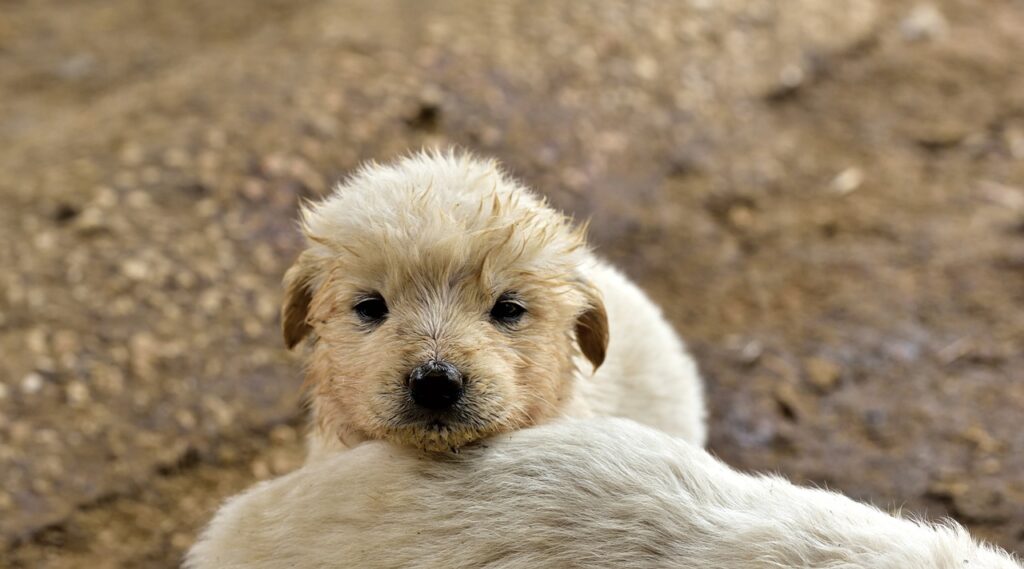

What are some common health problems in puppies ?
Here are some common health problems that puppies may encounter:-
1. The Parvovirus:-
Description:- The stomach and small intestine are affected by the highly contagious parvovirus disease. Direct contact with contaminated objects or infected dogs is how it spreads.
Signs and symptoms:- include weakness, dehydration, anorexia, bloody diarrhea, vomiting, fever, lethargy, and depression.
Therapy:- Although there isn’t a cure, supportive puppy care can help control symptoms. If a dog survives the first few days, most of them recover.
Prevention:- Make sure your puppy gets the entire parvo vaccine and that it only interacts in a private setting with adult dogs who have received all vaccinations.
2. Kennel cough:-
Characteristics:- A highly contagious respiratory illness, also called canine infectious tracheobronchitis.
Symptoms:- Chronic cough, sometimes referred to as “honking.”
Prevention:- Until your puppy receives their vaccinations, stay away from crowded areas.
3. Skin Issues:-
Description:- Allergies, parasites, or infections can cause allergies, redness, flakiness, hair loss, and other abnormal skin conditions in dogs.
Action:- See your veterinarian if your puppy exhibits symptoms of skin issues to avoid discomfort.
4. Ear Infections:-
Description:- Dogs suffering from ear infections may scratch their ears, shake their heads, and exhibit foul-smelling discharge from their ears.
Treatment:- In order to avert major harm, prompt veterinary care is essential.
5. UTIs, or urinary tract infections:-
Description:- A urinary tract infection (UTI) can result in frequent, inappropriate urination, bloody urine, and fatigue.
Action:- Get a urine check from your veterinarian if your puppy displays these symptoms.
Recall that frequent veterinary checkups and close observation help maintain your puppy health care and identify any problems early!
